| Listing 1 - 8 of 8 |
Sort by
|

ISBN: 025202592X Year: 2001 Publisher: Urbano ; Chicago University of Illinois Press
Abstract | Keywords | Export | Availability | Bookmark
 Loading...
Loading...Choose an application
- Reference Manager
- EndNote
- RefWorks (Direct export to RefWorks)
Poetry --- American literature --- Thematology --- Cold War in literature --- Guerre froide dans la littérature --- Koude oorlog in de literatuur --- American poetry --- 20th century --- History and criticism
Book
ISBN: 9780813931616 9780813931623 9780813931661 0813931665 0813931614 0813931622 1280490624 9781280490620 9786613585851 6613585858 Year: 2011 Publisher: Charlottesville : University of Virginia Press,
Abstract | Keywords | Export | Availability | Bookmark
 Loading...
Loading...Choose an application
- Reference Manager
- EndNote
- RefWorks (Direct export to RefWorks)
What does narrative look like when the possibility of an expansive future has been called into question? This query is the driving force behind Daniel Grausam's On Endings, which seeks to show how the core texts of American postmodernism are a response to the geopolitical dynamics of the Cold War and especially to the new potential for total nuclear conflict. Postwar American fiction needs to be rethought, he argues, by highlighting postmodern experimentation as a mode of profound historical consciousness. On Endings significantly extends the project of historicizing postmodernism while returning the nuclear to a central place in the study of the Cold War.
Barth, John --- Pynchon, Thomas --- Powers, Richard --- Cold War in literature --- Guerre froide dans la littérature --- Koude oorlog in de literatuur --- American fiction --- Cold War --- Postmodernism (Literature) --- American literature --- History and criticism&delete& --- Theory, etc --- Influence --- Barth, John, --- Powers, Richard, --- Bart, Dz︠h︡on, --- Pinchon, Tomas --- Criticism and interpretation. --- History and criticism --- Theory, etc. --- United States --- Criticism and interpretation --- Paouers, Ritsarnt, --- Παουερς, Ριτσαρντ, --- Cold War in literature. --- Influence.
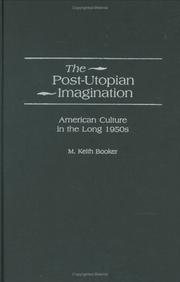
ISBN: 0313321655 Year: 2002 Volume: 13 Publisher: Westport, Conn. London Greenwood Press
Abstract | Keywords | Export | Availability | Bookmark
 Loading...
Loading...Choose an application
- Reference Manager
- EndNote
- RefWorks (Direct export to RefWorks)
Sociology of literature --- Fiction --- American literature --- anno 1900-1999 --- Cold War in literature --- Dys-utopies dans la littérature --- Dystopias in literature --- Dysutopieën in de literatuur --- Guerre froide dans la littérature --- Koude oorlog in de literatuur --- Littérature réaliste --- Neorealism (Literature) --- Neorealisme (Literatuur) --- Néoréalisme (Littérature) --- Realism (Literary movement) --- Realism in literature --- Realisme (Letterkundige beweging) --- Realisme (Literaire beweging) --- Realisme in de literatuur --- Realistische literatuur --- Réalisme (Mouvement littéraire) --- Réalisme dans la littérature --- American fiction --- 20th century --- History and criticism --- Politics and literature --- United States --- History --- Literature and society --- Popular culture --- Political fiction [American ] --- Motion pictures --- Thompson, Jim --- Criticism and interpretation
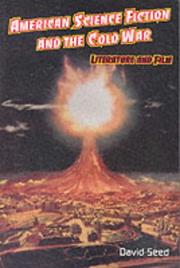
ISBN: 1853312274 Year: 1999 Publisher: Edinburgh : University of Edinburgh,
Abstract | Keywords | Export | Availability | Bookmark
 Loading...
Loading...Choose an application
- Reference Manager
- EndNote
- RefWorks (Direct export to RefWorks)
Fiction --- Thematology --- Film --- American literature --- Cold War --- Cold War in literature --- Dr. Folamour (Film) --- Dr. Strangelove (Film) --- Dr. Strangelove (motion picture) --- Guerre froide --- Guerre froide dans la littérature --- Koude oorlog --- Koude oorlog in de literatuur --- Oorlog [Koude ] --- Science fiction, American --- American fiction --- Science fiction films --- English --- Languages & Literatures --- American Literature --- History and criticism --- Science fiction [American ] --- 20th century --- Heinlein, Robert Anson --- Criticism and interpretation --- Anderson, Poul --- Pohl, Frederick --- Miller, Walter M. --- Hoban, Russell --- Wolfe, Bernard --- Kornbluth, C.M. --- Wylie, Philip --- Szilard, Leo --- SCIENCE-FICTION AMERICAINE --- FILMS DE SCIENCE-FICTION --- GUERRE DANS LA LITTERATURE --- GUERRE ET LITTERATURE --- HISTOIRE ET CRITIQUE

ISBN: 3861102455 Year: 2000 Volume: 3 Publisher: Sankt-Ingbert Röhrig
Abstract | Keywords | Export | Availability | Bookmark
 Loading...
Loading...Choose an application
- Reference Manager
- EndNote
- RefWorks (Direct export to RefWorks)
International groups --- Weiss, Peter --- Authors, German --- Holocaust, Jewish (1939-1945), in literature --- Concentration camps in literature --- Cold War in literature --- Ecrivains allemands --- Holocauste, 1939-1945 dans la littérature --- Camps de concentration dans la littérature --- Guerre froide dans la littérature --- Weiss, Peter, --- Criticism and interpretation --- 830 "19" WEISS, PETER --- Cold War --- World politics --- Duitse literatuur--20e eeuw. Periode 1900-1999--WEISS, PETER --- -Political and social views --- 830 "19" WEISS, PETER Duitse literatuur--20e eeuw. Periode 1900-1999--WEISS, PETER --- Holocauste, 1939-1945 dans la littérature --- Camps de concentration dans la littérature --- Guerre froide dans la littérature --- Vais, Peter, --- Veĭs, Peter, --- Political and social views. --- Criticism and interpretation. --- Nazi concentration camps in literature
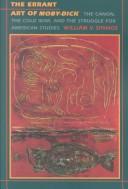
ISBN: 0822315998 0822379589 9780822315995 082231584X 1322141037 Year: 1995 Volume: *5 Publisher: Durham, N.C. : Duke University Press,
Abstract | Keywords | Export | Availability | Bookmark
 Loading...
Loading...Choose an application
- Reference Manager
- EndNote
- RefWorks (Direct export to RefWorks)
In The Errant Art of Moby-Dick, one of America’s most distinguished critics reexamines Melville’s monumental novel and turns the occasion into a meditation on the history and implications of canon formation. In Moby-Dick—a work virtually ignored and discredited at the time of its publication—William V. Spanos uncovers a text remarkably suited as a foundation for a "New Americanist" critique of the ideology based on Puritan origins that was codified in the canon established by "Old Americanist" critics from F. O. Matthiessen to Lionel Trilling. But Spanos also shows, with the novel still as his focus, the limitations of this "New Americanist" discourse and its failure to escape the totalizing imperial perspective it finds in its predecessor.Combining Heideggerian ontology with a sociopolitical perspective derived primarily from Foucault, the reading of Moby-Dick that forms the center of this book demonstrates that the traditional identification of Melville’s novel as a "romance" renders it complicitous in the discourse of the Cold War. At the same time, Spanos shows how New Americanist criticism overlooks the degree to which Moby-Dick anticipates not only America’s self-representation as the savior of the world against communism, but also the emergent postmodern and anti-imperial discourse deployed against such an image. Spanos’s critique reveals the extraordinary relevance of Melville’s novel as a post-Cold War text, foreshadowing not only the self-destructive end of the historical formation of the American cultural identity in the genocidal assault on Vietnam, but also the reactionary labeling of the current era as "the end of history."This provocative and challenging study presents not only a new view of the development of literary history in the United States, but a devastating critique of the genealogy of ideology in the American cultural establishment.
Sociology of literature --- Melville, Herman --- Canon (Literature) --- Canon (Literatuur) --- Canons littéraires --- Cold War --- Cold War in literature --- Guerre froide --- Guerre froide dans la littérature --- Koude oorlog --- Koude oorlog in de literatuur --- Literaire canon --- Oorlog [Koude ] --- Literature and society --- United States --- History --- 20th century --- American literature --- History and criticism --- Theory, etc. --- Criticism --- Politics and literature --- Sea stories [American ] --- Influence --- Sea stories, American --- Cold War. --- Melville, Herman, --- Influence. --- Classics, Literary --- Literary canon --- Literary classics --- Best books --- Literature --- World politics --- English literature --- Agrarians (Group of writers) --- American sea stories --- American fiction --- History and criticism&delete& --- Theory, etc --- Melvill, German --- Melville, Hermann --- Meville, Herman --- Melvil, Cherman --- Mai-erh-wei-erh, Ho-erh-man --- Melṿil, Herman --- Tarnmoor, Salvator R. --- מלוויל, הרמן, --- מלויל, הרמן, --- ميلڤيل، هرمن، --- 麥爾維爾, --- Virginian spending July in Vermont, --- Melvill, Herman,
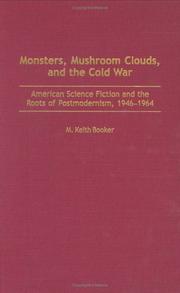
ISBN: 0313318735 Year: 2001 Volume: 95 Publisher: Westport London Greenwood Press
Abstract | Keywords | Export | Availability | Bookmark
 Loading...
Loading...Choose an application
- Reference Manager
- EndNote
- RefWorks (Direct export to RefWorks)
Fiction --- American literature --- anno 1940-1949 --- anno 1960-1969 --- anno 1950-1959 --- Aliens in literature --- Atomic bomb in literature --- Atoombom in de literatuur --- Bombe atomique dans la littérature --- Cold War in literature --- Einde van de wereld in de literatuur --- End of the world in literature --- Etrangers dans la littérature --- Fin du monde dans la littérature --- Guerre froide dans la littérature --- Koude oorlog in de literatuur --- Monsters in de literatuur --- Monsters in literature --- Monstres dans la littérature --- Vreemdelingen in de literatuur --- Science fiction, American --- American fiction --- Postmodernism (Literature) --- End of the world in literature. --- Atomic bomb in literature. --- Monsters in literature. --- Aliens in literature. --- Science-fiction américaine --- Roman américain --- Postmodernisme (Littérature) --- History and criticism. --- Histoire et critique --- Science-fiction américaine --- Roman américain --- Postmodernisme (Littérature) --- Fin du monde dans la littérature --- Bombe atomique dans la littérature --- Guerre froide dans la littérature --- Monstres dans la littérature --- Etrangers dans la littérature --- Science fiction [American ] --- History and criticism --- 20th century --- United States --- Noncitizens in literature.
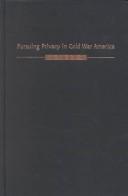
ISBN: 0231111215 0231111207 0231528698 0231505884 9780231111201 9780231111218 Year: 2002 Volume: *4 Publisher: New York : Columbia University Press,
Abstract | Keywords | Export | Availability | Bookmark
 Loading...
Loading...Choose an application
- Reference Manager
- EndNote
- RefWorks (Direct export to RefWorks)
Pursuing Privacy in Cold War America explores the relationship between confessional poetry and constitutional privacy doctrine, both of which emerged at the end of the 1950s. While the public declarations of the Supreme Court and the private declamations of the lyric poet may seem unrelated, both express the upheavals in American notions of privacy that marked the Cold War era. Nelson situates the poetry and legal decisions as part of a far wider anxiety about privacy that erupted across the social, cultural, and political spectrum during this period. She explores the panic over the "death of privacy" aroused by broad changes in postwar culture: the growth of suburbia, the advent of television, the popularity of psychoanalysis, the arrival of computer databases, and the spectacles of confession associated with McCarthyism.Examining this interchange between poetry and law at its most intense moments of reflection in the 1960s, '70s, and '80s, Deborah Nelson produces a rhetorical analysis of a privacy concept integral to postwar America's self-definition and to bedrock contradictions in Cold War ideology. Nelson argues that the desire to stabilize privacy in a constitutional right and the movement toward confession in postwar American poetry were not simply manifestations of the anxiety about privacy. Supreme Court justices and confessional poets such as Anne Sexton, Robert Lowell, W. D. Snodgrass, and Sylvia Plath were redefining the nature of privacy itself. Close reading of the poetry alongside the Supreme Court's shifting definitions of privacy in landmark decisions reveals a broader and deeper cultural metaphor at work.
Autobiografie in de literatuur --- Autobiographie dans la littérature --- Autobiography in literature --- Belijdenis in de literatuur --- Cold War in literature --- Confession dans la littérature --- Confession in literature --- Guerre froide dans la littérature --- Koude oorlog in de literatuur --- Privacy in de literatuur --- Privacy in literature --- Self in literature --- Soi dans la littérature --- Vie privée dans la littérature --- Zelf in de literatuur --- Amerikaans. --- Cold War (1945-1989) in literature. --- Cold War in literature. --- Confession in literature. --- Lyrik. --- Ost-West-Konflikt. --- Privacy in literature. --- Privacy, Right of. --- Privacy. --- Privatsphäre. --- Schutz. --- Self in literature. --- Poetry --- Sociology of literature --- American literature --- anno 1900-1999 --- American poetry --- American poetry. --- Autobiography in literature. --- Letterkunde. --- Literature and society --- Literature and society. --- Privacy --- Privacy, Right of --- History and criticism --- History --- 1900-1999. --- USA. --- United States. --- 20th century --- United States --- Privacy [Right of ] --- Privacy - United States - History - 20th century. --- History and criticism. --- Social psychology --- Secrecy --- Solitude --- Invasion of privacy --- Right of privacy --- Civil rights --- Libel and slander --- Personality (Law) --- Press law --- Computer crimes --- Confidential communications --- Data protection --- Right to be forgotten --- Law and legislation
| Listing 1 - 8 of 8 |
Sort by
|

 Search
Search Feedback
Feedback About
About Help
Help News
News